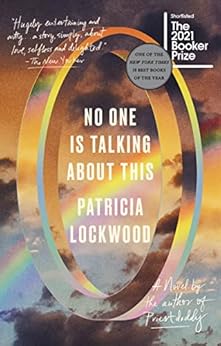
The narrator is consumed by the internet and speaking in disconnected tweet-like pronouncements. Her life is absurd and detached from reality. Yet she is navigating the world of politics, climate change, and much more based on online posts and queries. Online friends and communication’s impersonal and detached nature becomes painfully apparent when, in real life, her sister’s pregnancy is in peril. As a result, the story becomes more engaging and free-flowing in the second part of the book, but her humanity and vulnerabilities also take precedence. I decided that this book is an excellent statement about the differences between the chaos of online groupthink and the personal interactions that sometimes only occur in times of tragedy.
The first time I attempted to read this book, I couldn’t follow Lockwood’s disjointed commentary about many disparate issues. Although I could figure out what most of the allusions referred to, I wasn’t sure there was any inherent value to continuing to read. But, after reading several reviews and noting that The New York Times named No One is Talking About This as one of the best books of 2021 and realizing it was nominated for a Booker Prize, I went back to it. This time it was so much more engaging –especially the second part.
Since I just finished facilitating a discussion group about millennial authors. I looked up Lockwood’s age, and since she was born in 1981, she is a millennial, and the writing reflects many of the attributes of other works written by her age group:
How global capitalism affects an individual and a desire to hate it
Derision for haters
Thorny issues related to money and class
Social media and digital communication everywhere
Satire, sometimes very dark
Being influenced and influencing others
Rootless, anxious life
Some quotes from the book that I noted include:
Capitalism! It was important to hate it, even though it was how you got money. Slowly, slowly, she found herself moving toward a position so philosophical even Jesus couldn’t have held it: that she must hate capitalism while at the same time loving film montages
(p. 4). Penguin Publishing Group. Kindle Edition.
Every day their attention must turn, like the shine on a school of fish, all at once, toward a new person to hate. Sometimes the subject was a war criminal, but other times it was someone who made a heinous substitution in guacamole. It was not so much the hatred she was interested in as the swift attenuation, as if their collective blood had made a decision.
(p. 9). Penguin Publishing Group. Kindle Edition.
White people, who had the political educations of potatoes—lumpy, unseasoned, and biased toward the Irish—were suddenly feeling compelled to speak out about injustice.
(p. 33). Penguin Publishing Group. Kindle Edition.
Even a spate of sternly worded articles called “Guess What: Tech Has an Ethics Problem” was not making tech have less of an ethics problem. Oh man. If that wasn’t doing it, what would??
(p. 64). Penguin Publishing Group. Kindle Edition.


